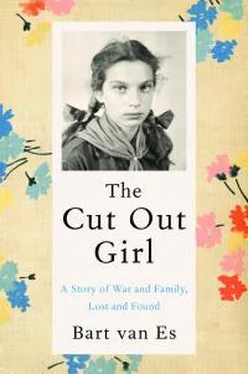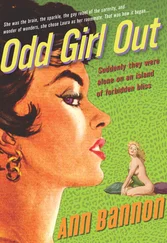—
UNLIKE THE HAGUE, Dordrecht has only one railway station. It is also like a palace, only a bit smaller, without the princess towers of the station they left behind. They walk through another park—bigger than theirs at home and sleepy in the afternoon sunlight—then through streets with little houses, nothing at all like the three-story apartment blocks of The Hague. Her legs are tired now and it takes a bit longer each time to get to a new corner, but at each one Mrs. Heroma tells her the street name and then a funny one from somewhere else in Holland, so Lien presses on. Mauritsweg (Trousers Street), Krispijnseweg (Buttermountain Street), and finally Bilderdijkstraat (Rabbitpipe Street), and they have arrived. All the houses that Lien has passed seemed little compared to the city, but these ones in the Bilderdijkstraat are the littlest of all. In fact, the street doesn’t really look like it has houses; it has just two long, low, redbrick walls with doors and windows set in it, stretching as far as Lien can see.
In the road a group of boys is running and shouting. Mrs. Heroma, ignoring the commotion, walks straight to the door of number 10 and knocks hard on the little round windowpane. In her coat pocket, unbeknown to Lien, there is a letter. It is written in the same steady hand that her mother used on the second page of the little girl’s album. The letter, which still survives in Lien’s apartment in Amsterdam, is dated August 1942. It reads as follows:
Most Honored Sir and Madam
Although you are unknown to me, I imagine you for myself as a man and a woman who will, as a father and mother, care for my only child. She has been taken from me by circumstance. May you, with the best will and wisdom, look after her.
Imagine for yourself the parting between us. When shall we ever see her again? On 7 September she will be nine. I hope it will be a joyful day for her.
I want to say to you that it is my wish that she will think only of you as her mother and father and that, in the moments of sadness that will come to her, you will comfort her as such.
If God wills it, we will all, after the war, shake one another by the hand in joyous reunion. Directed to you as the father and mother of:
Lientje
Four
I am on a train approaching Dordrecht (colloquially known as Dordt), the city to which Lien was brought in the late summer of 1942. Seen from the railway bridge before we pull into the station, its Great Church rises up between pretty gabled houses, beyond which lie harbors and a heavy industrial zone. Though small by today’s standards, with a population of around 120,000, this was once the biggest city in Holland. Built on an island that was created by a confluence of rivers, Dordt saw its heyday back in the fifteenth century, when it became a natural center for the handling of agricultural goods. For a while it was a merchant city. The silt-filled rivers, however, proved unsuitable for the larger ships that soon became necessary for ocean trading, which meant that, over time, Dordt was overtaken by its larger westerly neighbor, Rotterdam.
It was here rather than in The Hague that Dutch independence really started. In 1572 the city hosted the First Assembly of the Free States, at which William of Nassau, Prince of Orange, announced his open rebellion against the Spanish king. It was also here, at the Synod of Dordt, that the new republic, having proved victorious, decided on its state religion. From 1618 to 1619 the Protestant churches of Europe gathered to debate the great theological questions. On the one side stood the followers of Arminius, who felt that some kind of accommodation with Catholicism might be possible: perhaps grace (that great act of divine forgiveness for man’s innate sinfulness) could indeed be fostered by human action, such as penitence or good deeds? Opposing them were the Calvinists, who insisted on what they termed the total depravity of human beings. According to Calvin, only a small band of individuals, already chosen by God before the beginning of time, would be saved from damnation, no matter how fervently the others might try to join that “elect.” The synod ended in a Calvinist triumph and only four days after its conclusion the main protector of the Arminians, Johan van Oldenbarnevelt, was led to execution on the block. Total depravity was thus confirmed.
—
AFTER LEAVING THE FUNCTIONAL INTERIOR of the station, I look back over my shoulder at its classical facade and then head down the main street into town. My plan is to begin by visiting the small local war museum. It is only a short walk, first through an area of modern office blocks and then through a set of pretty medieval streets that are full of cyclists and shoppers. At this hour of the morning these are mostly retired couples wearing practical clothing such as jogging bottoms and zip-up raincoats in bright artificial colors, like purple, lime green, and pink.
The museum, which is located in a town house across from the old harbor, is like hundreds of others: a little faded and cramped, with overbright lighting so that nothing looks real. In the entrance hall, pride of place is given to an army jeep that stands in the middle of the foyer on a dais of artificial grass. Stiff mannequins sit inside it. Their clean helmets have tightly fitting chinstraps and they smile, eyes forward, like Lego men. Behind, there are maps showing the German landings and then the Allied liberation. Bold arrows show troop movements accompanied by numbers and dates. Elsewhere there are photographs and display cases full of weapons, documents, and medals.
Dordrecht was one of the towns that saw real fighting when the Germans invaded. Paratroopers were dropped at first light on May 10, 1940, to seize the bridges. The city had a garrison of fifteen hundred soldiers, but the Dutch army, which had not fought a real war for more than two centuries, was spectacularly ill prepared. Few of the men had received full combat training and much of their ammunition was locked in a central depot for safekeeping, so they had only a minimal supply of rounds. In the early hours, many of the defenders simply looked up to the sky in awe of the Junkers bombers. Others wasted their supply of bullets trying to shoot them down.
All the same, once the shock of the landing abated, there were pitched battles. On day one, dozens of German assault troops were killed or wounded and around eighty were taken prisoner and shipped to England just in time. Then on May 13, around twenty Panzers rolled into the city, of which fifteen were disabled at the cost of twenty-four Dutch lives. After just four days of fighting, however, Dordt, like the rest of the Netherlands, surrendered and the troops spent the last of their energy destroying their own equipment to prevent it from falling into enemy hands.
—
AS THE SOLE VISITOR TO THE MUSEUM, I feel a little intrusive. Around me the men who work here (I should imagine on a voluntary basis) are checking stock lists, cleaning objects from the display cases, and reorganizing the small library of books about the war. As I stand scanning the battered spines, I turn to a man in a blue shirt with white hair who is sorting piles of volumes at a desk. He looks up, pleased at my interest in history and still more so when I tell him about Lien and her journey here from The Hague. At the mention of Mrs. Heroma, who brought Lien to Dordrecht, a look of recognition crosses his face. He asks what information I have.
On my laptop, which I take from my suitcase, there is a photograph of a document: a yellow sheet of lined A4 paper covered in jottings, some crossed out. It is headed “What should play a role in the construction of a new law?” The document is in the hand of Mrs. Heroma, and I took the photo of it in Amsterdam. It came to Lien after Mrs. Heroma’s death. By the time these jottings were made, long after the war, Dieuke Heroma-Meilink (known as “Took” to her friends) was a Labor politician, first in parliament and then at the UN. The annotations on the paper are practical, with Lien cited only briefly as a case of an only child who had to join a larger family. A detail makes the situation human: as Lien’s mother pulled the front door shut at the Pletterijstraat, Mrs. Heroma heard her beginning to sob.
Читать дальше












